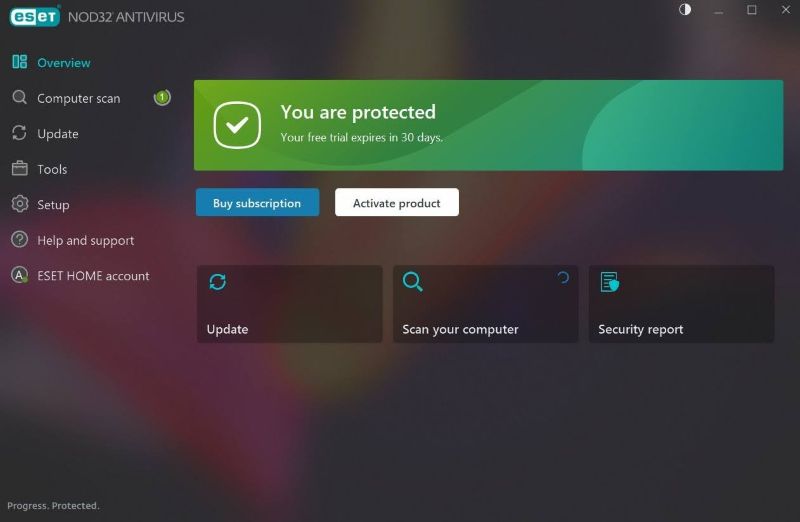TechRadar Verdict
ESET Antivirus has mixed independent testing lab results and it’s not always easy to use, but experienced users will appreciate the packages’ advanced features and low-level configurability.
Pros
- +
Minimal performance impact
- +
Highly configurable
- +
Expert-level device control
- +
Coverage for up to 10 devices for 3 years
- +
30-day money-back guarantee
Cons
- -
Mixed results from independent labs
Why you can trust TechRadar
This is our all-in-one roundup reviewing every ESET consumer security solution for 2025. On this page, after our brief intro, you’ll find
(a) a full evaluation of the entry-level ESET NOD32 Antivirus, along with our reviews of the additional features incorporated with the rest of the range:
(b) ESET Home Security Essential,
(c) ESET Home Security Premium, and
(d) the top-end package ESET Home Security Ultimate
You can jump to the reviews of those individual products by clicking on the links in the bar at the top of this page, but bear in mind that this article is really designed to be read all the way through, as the features of ESET NOD32 Antivirus are also present in the higher-level security suites, of course.
ESET’s home user range starts with ESET NOD32 Antivirus, which focuses on the antivirus, anti-phishing, and anti-ransomware basics. It supports Windows, Mac, and Linux, with the pricing beginning at $39.99 for a single-device, one-year license. Extending the license to cover five devices during three years is possible at $179.97.
Upgrading to ESET Home Security Essential adds a spam filter, parental controls, webcam protection, a secure browser to protect online transactions, and an anti-theft feature for Windows. It also throws in a firewall, traffic monitoring, Android support, and a vulnerability scanner feature for your home devices. Prices start at a reasonable $49.99 for a single-device, one-year license, rising to $227.98 (284.97 on renewal) to cover 10 devices over three years.
Next is ESET Home Security Premium, which extends the suite with a password manager, file and folder encryption, and a LiveGuard feature to proactively discover and stop previously unseen types of threats, starting at $59.99 for one device during one year, and increasing to $251.98 ($314.97 upon renewing) for a 10-device, three-year license.
Finally, ESET Home Security Ultimate tops the range with the addition of enhanced browser and privacy protection and unlimited VPN. It starts at $179.99 for a five-device, one-year license, climbing to $614.97 to expand coverage on 10 devices for the duration of three years.
ESET NOD32 Antivirus
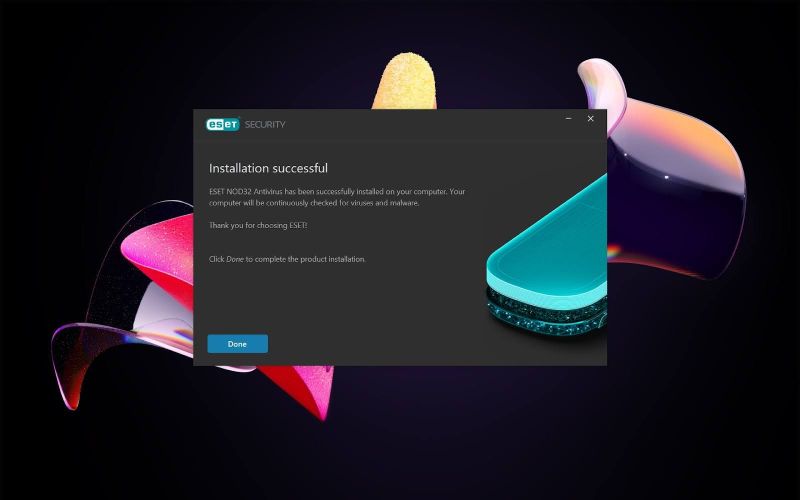
Installing ESET NOD32 Antivirus is as easy as it gets. Upon successful installation, ESET NOD32 Antivirus automatically launches a full system scan.
The executables and data files grab about 100MB of hard drive space, which is very little, there are three background processes, and you can use your system as usual when it’s on.
Besides, AV-Comparatives’ November 2024 Performance Test has also delivered mostly positive results, placing ESET fifth out of 17 for minimal impact on system performance.
Sign up to the TechRadar Pro newsletter to get all the top news, opinion, features and guidance your business needs to succeed!
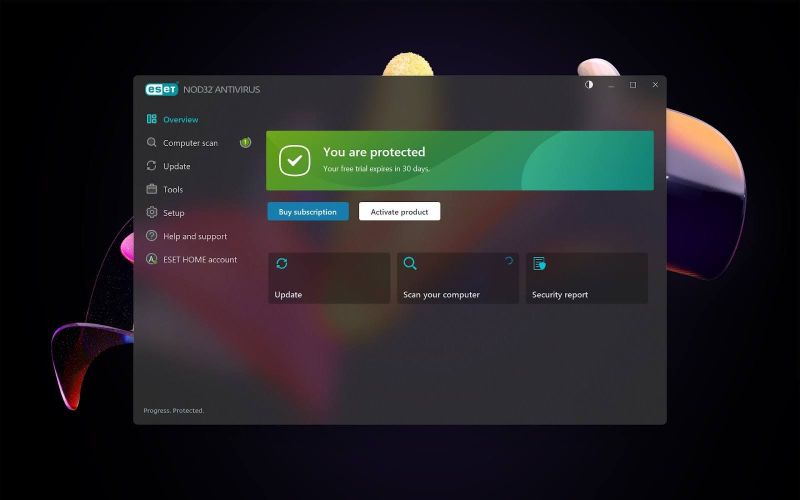
Interface
ESET NOD32 features a clear and easy-to-use dashboard showing your current security status, allowing you to launch a full system scan with a click, as well as a sidebar that enables browsing the program’s other options. You can also drag and drop features to arrange them in the most convenient way for you.
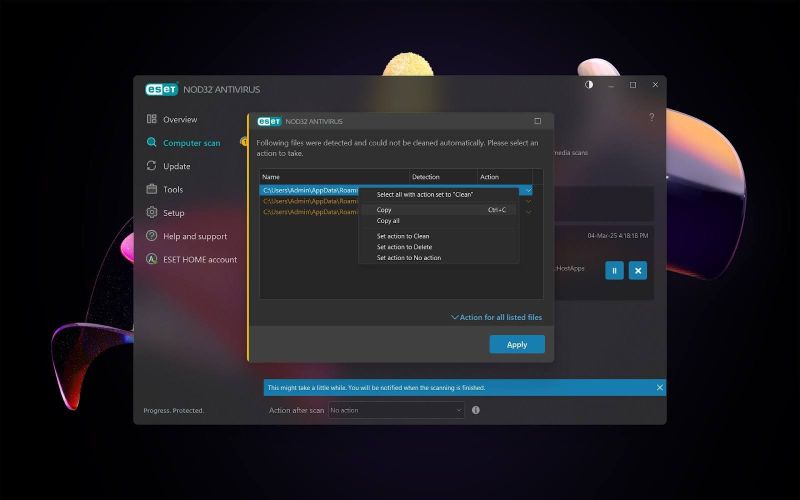
You can also drag-and-drop files or folders you wish to scan separately. The logs for individually scanned items can be exported into an XML or TXT file using a right-click menu inside the recent antivirus events. It is also possible to filter items by multiple parameters.
Antivirus
Scan types might be a bit more limited than some of the competitors’ - there are only Full System, Removable Devices, and Custom scans. There’s no Quick Scan - at least as a standard, as it’s actually possible to create scan profiles to run more limited checks.
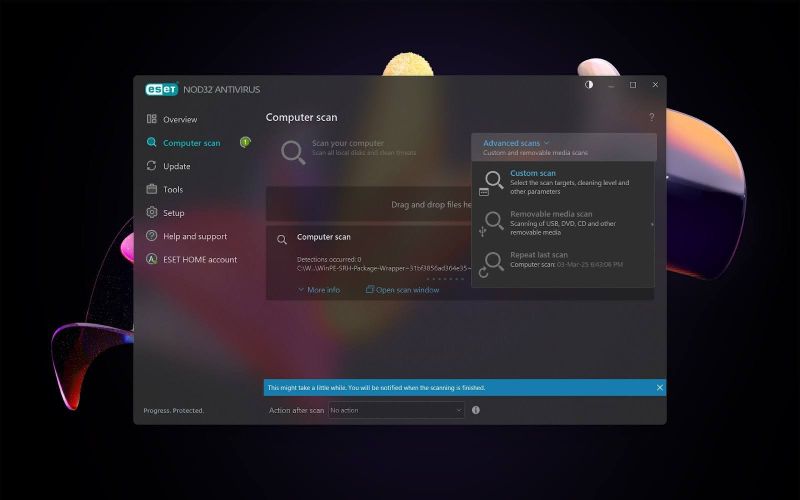
The app scanned our 80GB test system in less than 10 minutes during the first run, and 6 minutes for the second, which is a rather fast time.
If you feel comfortable enough with tinkering, you can browse the Advanced Settings box for expert-level options ranging from basic objects to scan (boot sectors, network drives, archives, and more) to finer details like email protocols to check/ignore and the level of nested zip files to scan.
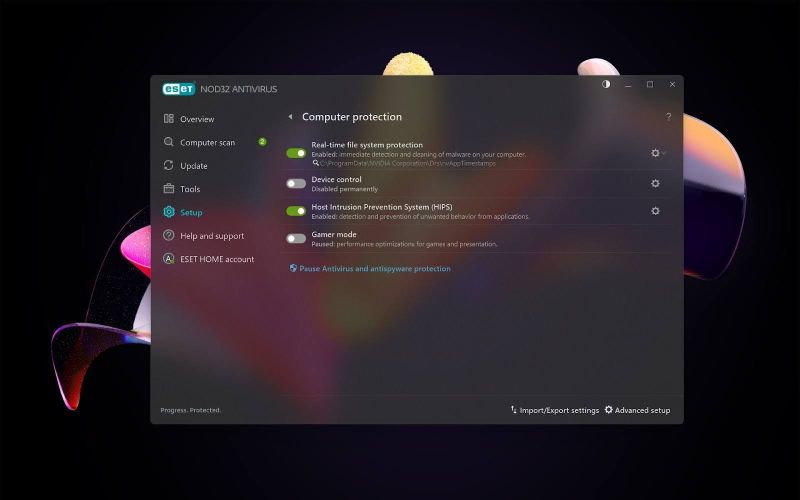
For more flexibility, you can right-click a file in Explorer, and ESET NOD32 gives you the option to scan it for threats. You can also check the file’s reputation, scan it without cleaning it, submit it for analysis, or manually quarantine it even if it’s not been flagged as malware but you’re concerned about it.

Protection
AV-Comparatives’ Real-World Protection Test summary report for July-October 2024 saw ESET in fifth place (out of 16), with a protection rating of 99.2%.
In terms of AV-Test’s Home Windows User reports, ESET performed marvelously, scoring maximum points for the past year in areas of protection, performance, and usability.
Blocking malicious sites
ESET NOD32 Antivirus is equipped with multiple URL defense system layers. They include web access protection, an anti-phishing option, traffic scanning, and browser protection through an advanced script scanner, all built into the core engine.
This means that there’s no need to install browser extensions or worry about supported or unsupported browsers - you’re automatically covered for everything that accesses the World Wide Web.
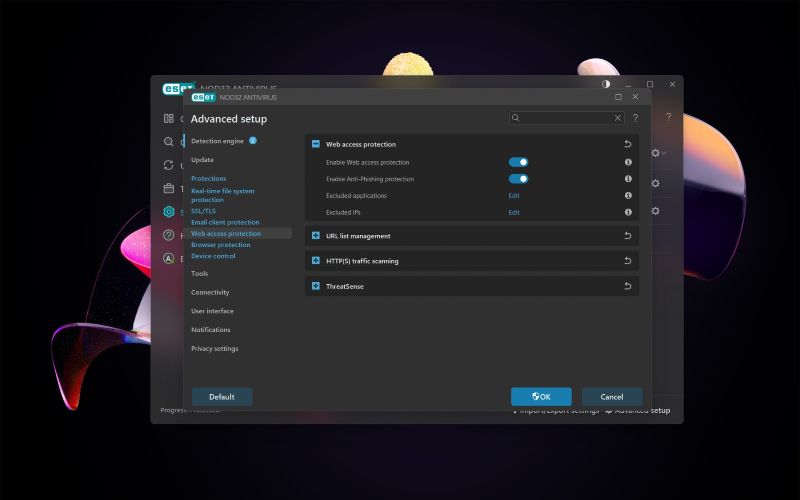
There are a lot of configuration options here as well. Most are on/off switches, like those for scanning HTTP sites, as well as creating handy blacklists and whitelists of sites to always/never be blocked, alongside ThreatSense which combines various complex threat detection methods.
AV-Comparatives’ 2024 Anti-Phishing Test discovered that ESET blocked 87% of malicious URLs and delivered no false positives, thus outperforming NordVPN Threat Protection Pro (85%), but trailing behind Kaspersky (93%), McAfee (92%), and Avast (91%).
Device control
Extras start with Device Control, an unusual feature that enables defining what happens when users connect any type of a host device to the system, be it external storage, a USB printer, a Bluetooth device, a scanner, a smart card reader, modems, and more.
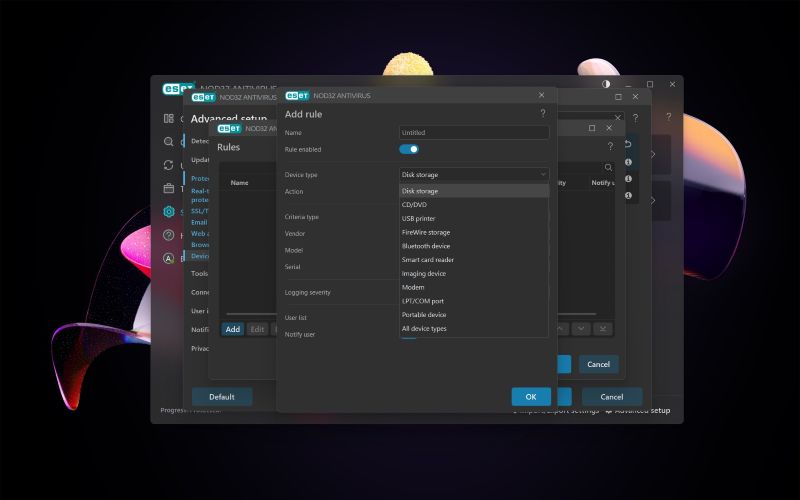
Specifically, options include making devices read-only, displaying a warning to users, or blocking them entirely. Rules can apply to all or specific devices, as well as to some or all user accounts. The system logs all device connections for later review.
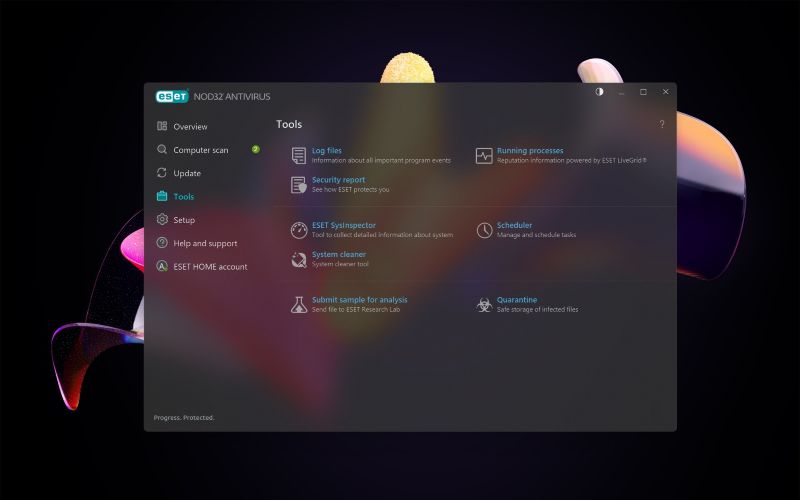
More features
ESET NOD32 doesn’t have the usual bonus tools that many other security apps do, so there’s no password manager, file shredder, junk file cleaner, and the like. However, there are some uncommon options hidden away in the Tools menu.
Here, you can view logs, see what the program has blocked, monitor running processes with additional reputation information from ESET LiveGrid, fire up the ESET SysInspector that collects detailed information about your system, clean your device, and more.
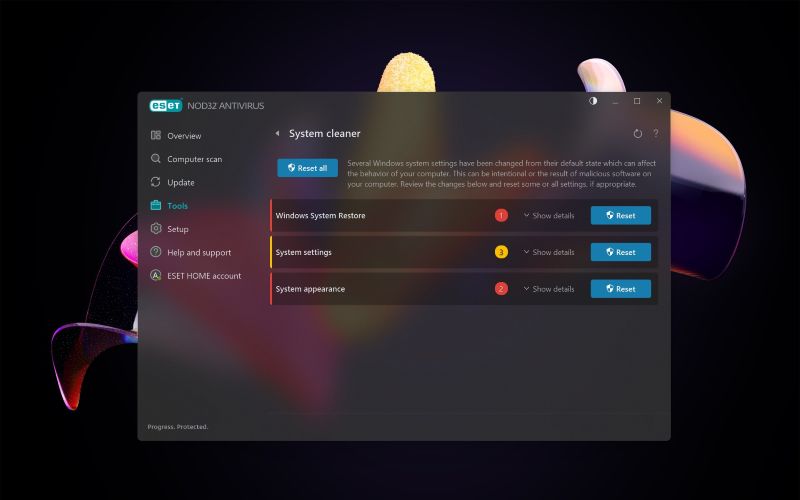
That said, some of these hidden features may be a little odd. The System Cleaner claims to warn you if key Windows settings have been changed from their defaults (because of malware, for example), but it doesn’t offer enough information to make a clear decision.

Meanwhile, ESET SysInspector takes the spotlight by taking a snapshot of your system and highlighting interesting items: running processes, network connections, critical files (HOSTS), important Registry entries, and more, something like an extended task manager.
Final verdict
ESET NOD32 is an interesting antivirus that boasts some expert-level tweaks and tools, as well as boasting solid results from the independent testing labs.
ESET Home Security Essential
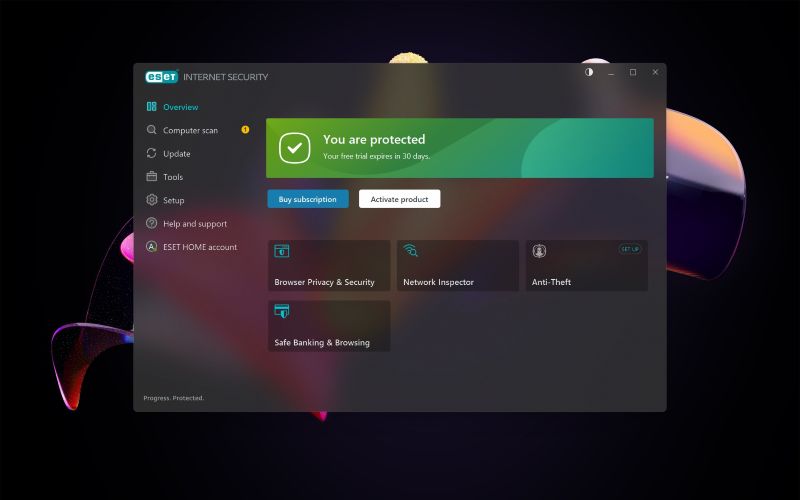
Previously known as ESET Internet Security, the Home Security Essential builds upon the NOD32 Antivirus edition, adding a firewall, spam filter, parental controls, webcam protection, network monitoring, extra network attack and botnet protection, an anti-theft feature for Windows, as well as an Android app.
Firewall
ESET Home Security Essential’s firewall starts in automatic mode, allowing all outgoing traffic without making any filtering attempts while blocking uninitiated traffic from the web.
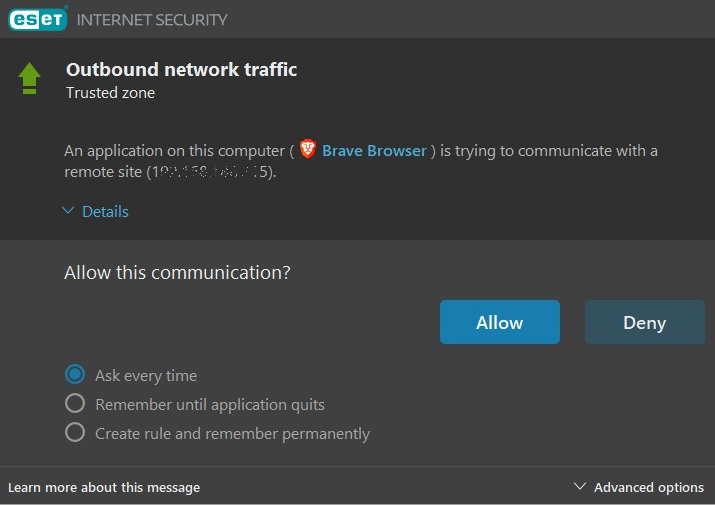
It doesn’t tell you that outbound traffic is unfiltered by default, so if a process tries to get online, it can. Secondly, even if you enable the alternative Interactive Mode, it still won’t make any decisions by itself, instead asking you whether it should trust any application making an outbound connection.
And it’s literally any application, including the most well-known and trusted processes such as Firefox, Chrome, Windows system processes, and others. While this may be straightforward for the above apps, looking at something like ‘64DriverLoad.exe is trying to communicate with remote site 255.255.255.255’ won’t make much sense.
ESET also offers a firewall Learning Mode, which the company says ‘automatically creates and saves rules according to predefined parameters’ but warns shouldn’t be used permanently as it’s intended for initial configuration only.
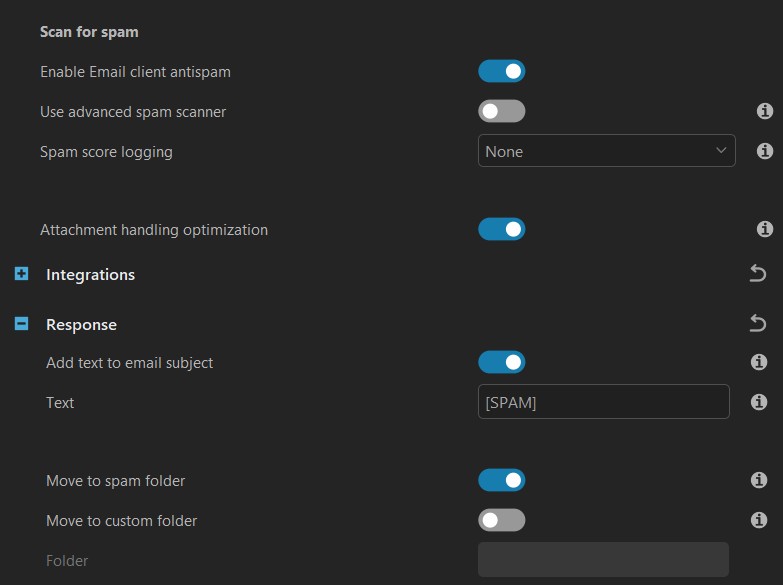
Spam filter
ESET Home Security Essential’s spam filter can integrate into Microsoft Outlook. It is quite capable, allowing you to decide whether to scan incoming, outgoing, and read emails, select an action to take (delete, move to the spam or a specified folder), add custom text to the subject line, and log the spam score.

Other features
ESET Home Security Essential’s webcam protection is powered by a very configurable rules-based system, so you can always allow access to some apps, block others, prompt for a few, or just automatically block everything.
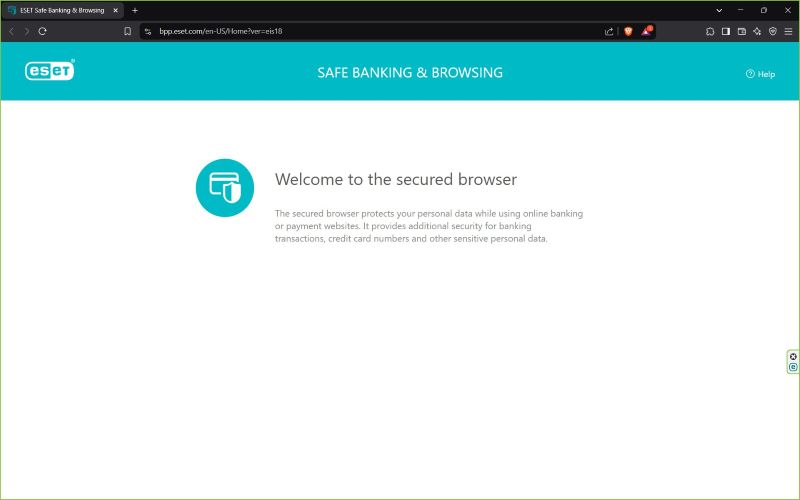
The Banking and Protection feature opens your default browser in a hardened form which ESET says makes it more difficult for keyloggers to capture personal data.
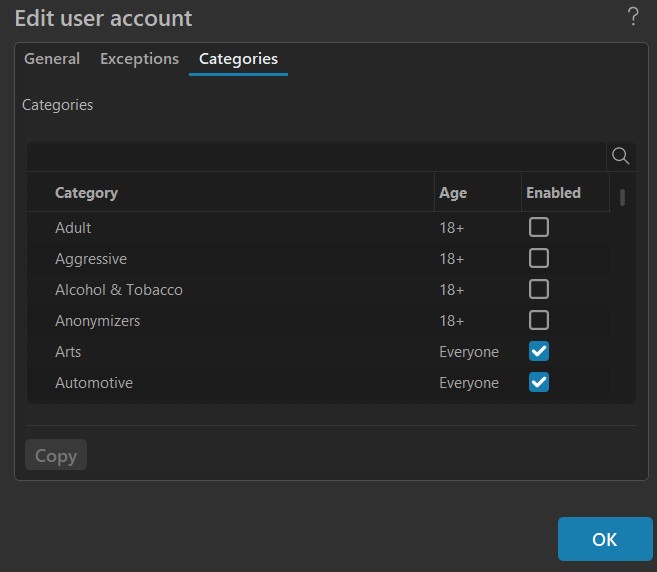
In terms of Parental Controls, ESET’s are also very basic, with support for content filtering and activity logging, but nothing else, even the basic functionality like restricting internet access or device use by time.
At the same time, the Anti-Theft feature allows you to track your device’s location, use webcam image capture to get a view of its location or send a message to its finder.
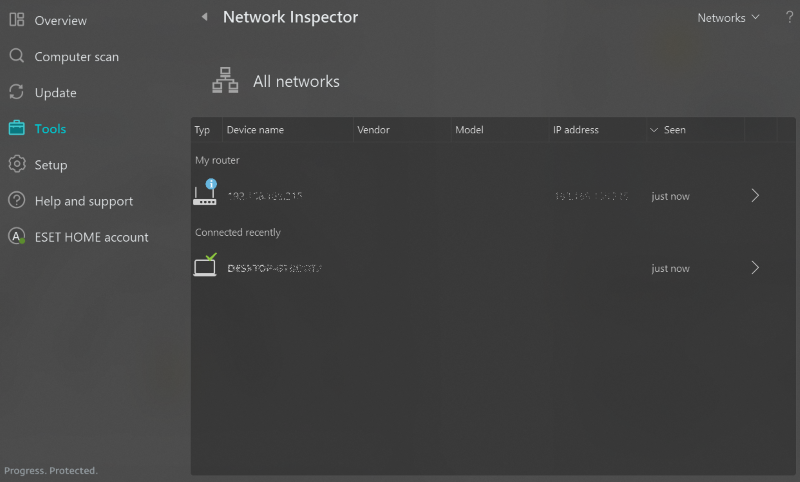
Elsewhere, the Network Inspector lists devices connected to your network and raises alerts for any new connections. It can scan your network for open ports, weak router passwords, and other vulnerabilities.
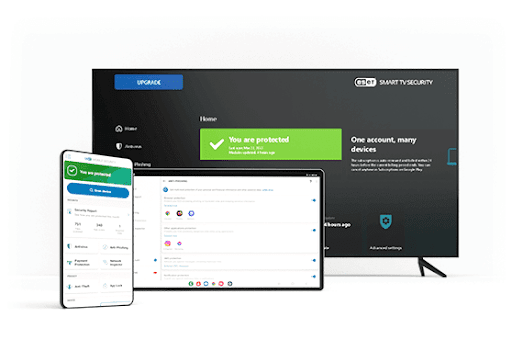
Internet Security App
ESET Home Security Essential also has Android support, and upgrading from a free Mobile Security and Antivirus app packs extras, from mobile versions of desktop tools (anti-theft, banking protection, network monitor), to an app locker, security audit, and more.
AV-Test’s January 2025 Android Test gave it full marks for protection, performance, and usability.
Final verdict
ESET Home Security Essential has a long list of features, some impressive, some not as much. If you’re an ESET fan or need this precise feature set, the suite might be interesting, but if not, you might want to look elsewhere.
ESET Home Security Premium
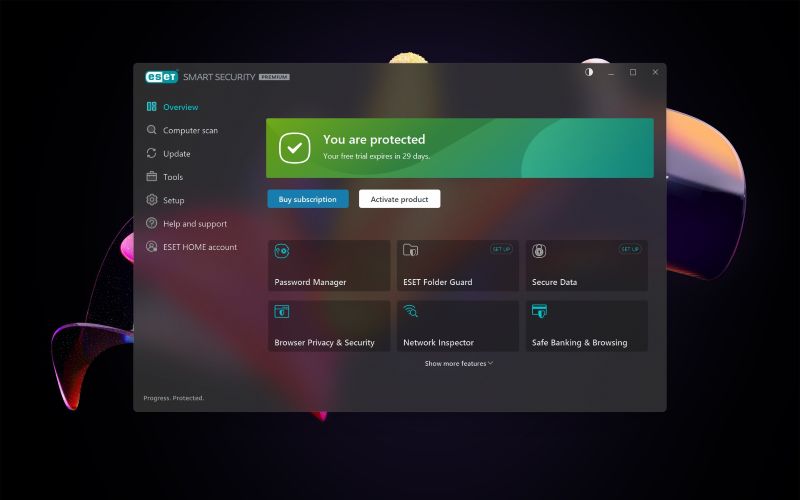
Previously called ESET Smart Security Premium, the ESET Home Security Premium adds the new LiveGuard feature (an extra layer of cloud analysis), a password manager, and a file encryption system to the Home Security Essential’s feature list.
Live Guard
The LiveGuard tech is a new form of cloud analysis aiming to detect the very latest and yet undiscovered threats. This means that, if you turn it on, whenever you access a file it hasn’t seen before, it will automatically send it to the ESET cloud for in-depth testing.
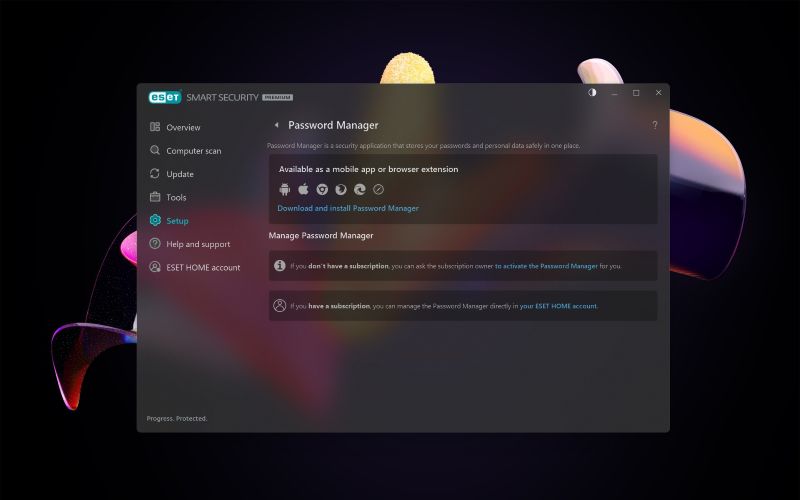
Password manager
Although it’s not as powerful as specialist standalone apps like Dashlane and LastPass, ESET’s Password Manager is smarter than the efforts you get with most security suites, and it covers the basics well enough.
Wide platform support includes apps for Android, iOS, and Mac, as well as browser extensions for Chrome, Firefox, Edge, and Safari. You can import passwords from Chrome, Firefox, and a range of other password managers (1Password, LastPass, Dashlane, BitWarden, Enpass, and many more).
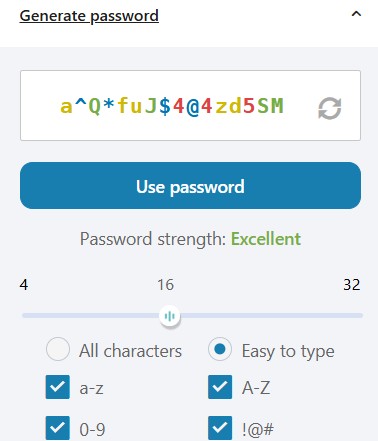
Once you’re up and running, the browser extensions allow you to generate secure and customized passwords, save your credentials, sync them across devices, and automatically fill in web forms.
You can also create one or more Identities, with personal details to be automatically filled into web forms: name, address, date and place of birth, common forms of web ID, credit card information, and more.
The service also highlights particularly weak and reused passwords.
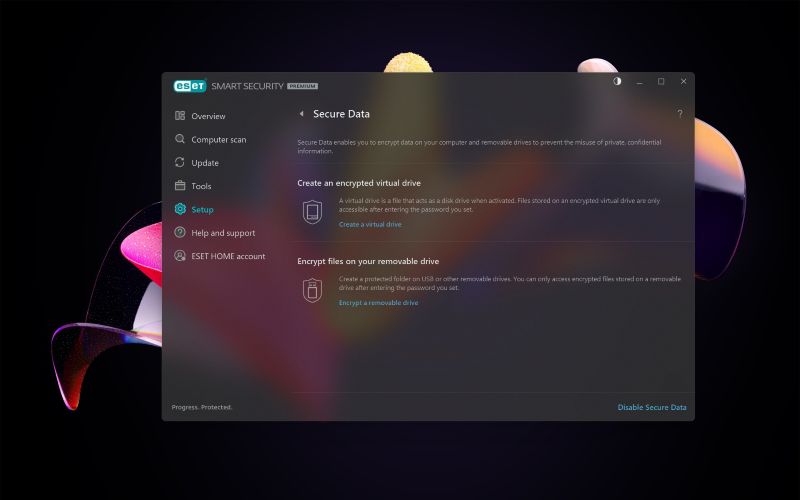
Secure data
Finally, the Secure Data feature allows you to create an encrypted vault on a hard drive, USB stick, or another device. The vault is opened with a password and acts like a virtual drive or folder, where you can save or copy files to encrypt them, or open or view them to decrypt them.
Final verdict
All things considered, ESET Home Security Premium is a solid offering, especially taking into account its extras - the password manager, LiveGuard service, and Secure Data option. However, if you don’t need any of these, you may want to skip this package.
ESET Home Security Ultimate
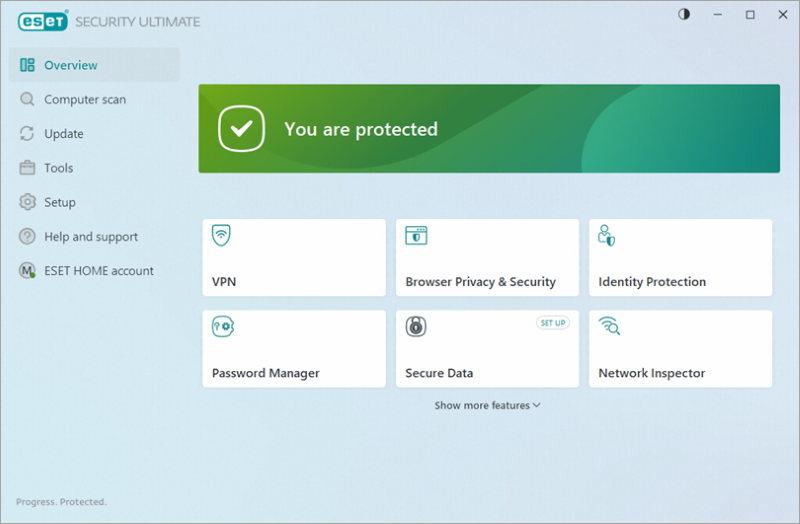
ESET’s top-of-the-line Home Security Ultimate adds enhanced browser and privacy protection, unlimited VPN, as well as identity protection through dark web scanning, credit report monitoring, identity threat alerts, SSN tracking, lost wallet assistance, and recovery alongside $1 million insurance.
That said, due to local legislative and sales barriers, this tier may not be available in many countries at the time of writing, and these are listed on the website.
Enhanced browser and privacy protection
Ultimate takes Premium’s browser security and privacy to a whole new level with identity protection, dark web scanning, credit report monitoring, social media identity monitoring, identity threat alerts, SSN tracking, lost wallet assistance, and identity recovery alongside $1 million insurance.
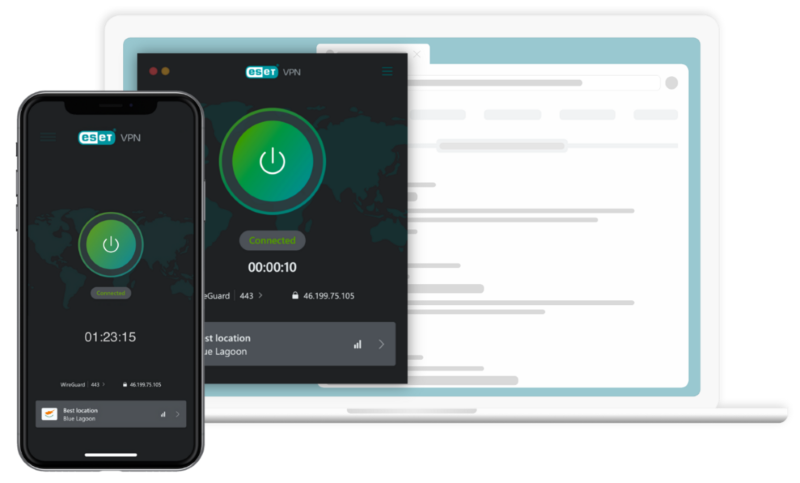
Unlimited VPN
An especially useful feature added by Ultimate is the unlimited ESET VPN, which is available on Windows, macOS, smartphones, and tablets, with a guaranteed no-logs policy, zero tracking, DNS leak protection, and MAC spoofing protection.
You’ll also get access to servers in over 60 locations around the world. The VPN allows you to unblock geo-restricted content, ‘kills’ the internet when the VPN is off, enables you to decide which apps to pass through it, as well as configure which proxies and connection protocols you want to use (WireGuard, IKEv2 (IPsec), UDP, TCP, Stealth, or Wstunnel).
Final verdict
The unlimited VPN, aside from the advanced identity protections and insurance, makes ESET Home Security Ultimate a complete and desirable package for anyone concerned with online privacy and identity - unless you’re in one of the excluded countries, that is.
We've also highlighted the best antivirus

Mike is a lead security reviewer at Future, where he stress-tests VPNs, antivirus and more to find out which services are sure to keep you safe, and which are best avoided. Mike began his career as a lead software developer in the engineering world, where his creations were used by big-name companies from Rolls Royce to British Nuclear Fuels and British Aerospace. The early PC viruses caught Mike's attention, and he developed an interest in analyzing malware, and learning the low-level technical details of how Windows and network security work under the hood.
You must confirm your public display name before commenting
Please logout and then login again, you will then be prompted to enter your display name.
